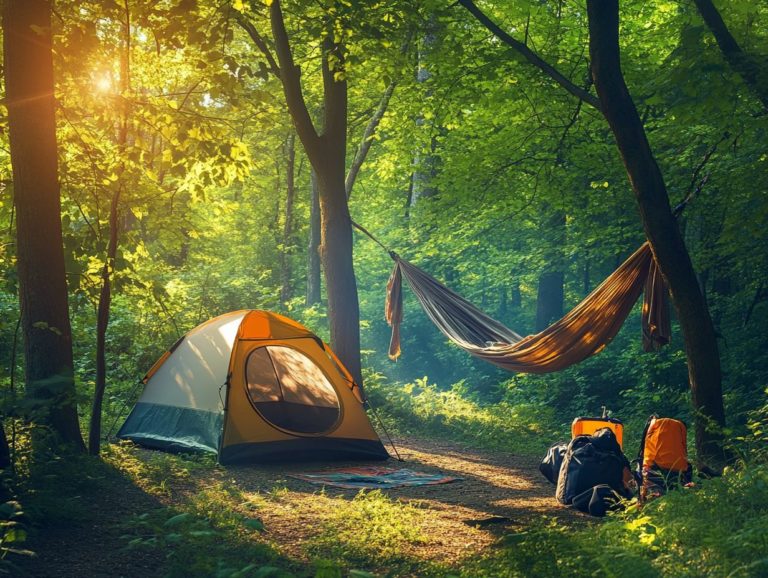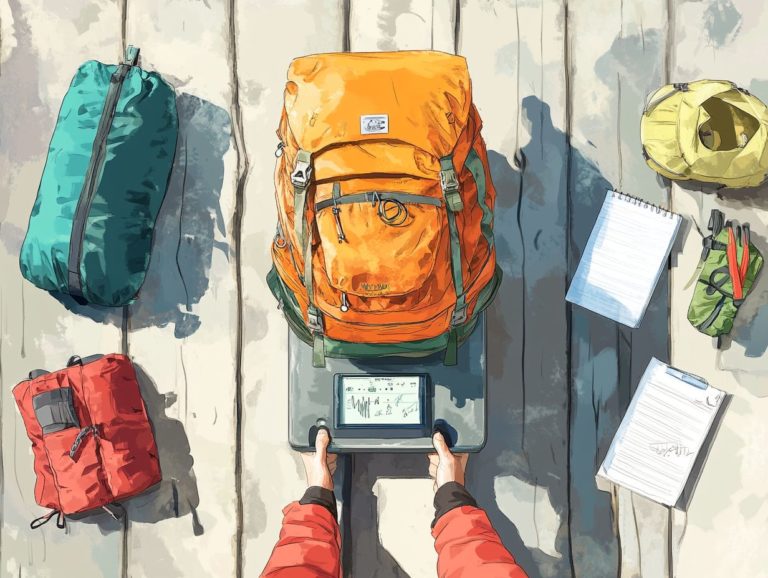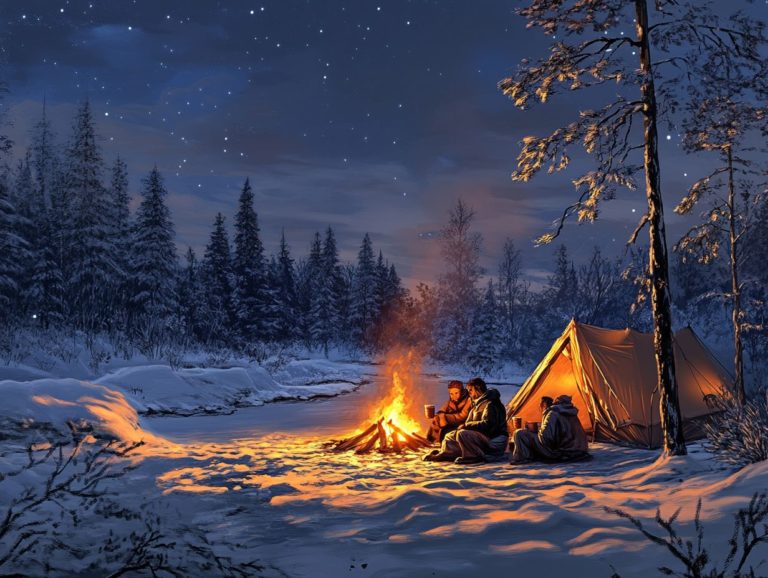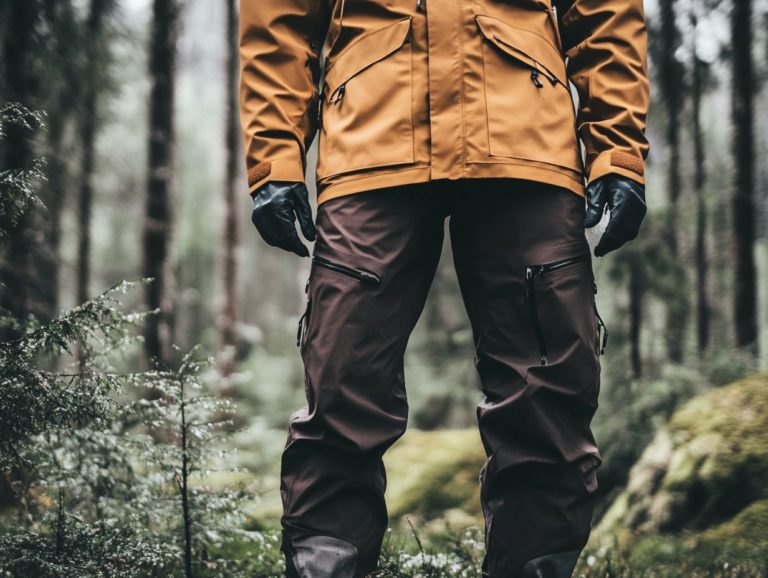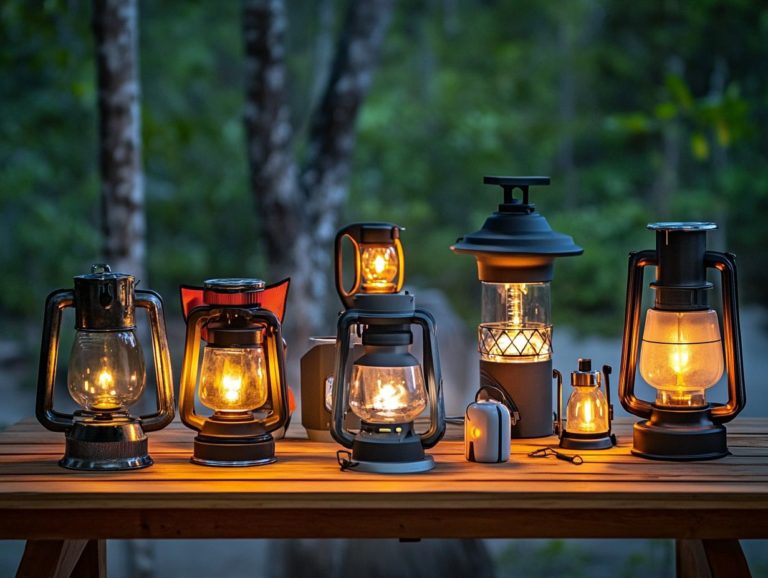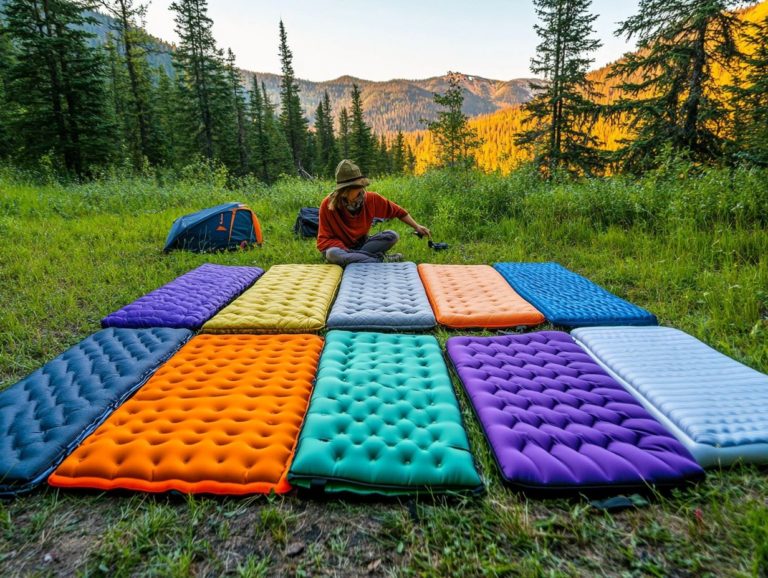How to Stay Hydrated While Hiking?
Staying properly hydrated is essential for an enjoyable and successful hiking trip. Dehydration affects your performance on the trail. It can cause fatigue, dizziness, and serious health issues.
This article delves into the effects of dehydration, equipping you to recognize its signs and symptoms while hiking. You’ll find practical tips for staying hydrated. Discover the best beverages to carry along and learn strategies to ensure you re well-hydrated before you hit the trail.
Get ready to hike smarter and safer today, especially if you’re among senior hikers or older adults!
Contents
- Key Takeaways:
- The Importance of Hydration During Hiking
- Signs and Symptoms of Dehydration While Hiking
- How to Stay Hydrated While Hiking
- What to Drink While Hiking
- Preparing for a Hydrating Hike
- Frequently Asked Questions
- What is the recommended amount of water to drink while hiking?
- How often should I stop to drink water while hiking?
- What are some signs of dehydration while hiking?
- Are there any alternatives to water for staying hydrated while hiking?
- How can I make sure I have enough water for a long hike?
- What are some tips for staying hydrated while hiking in hot weather?
Key Takeaways:
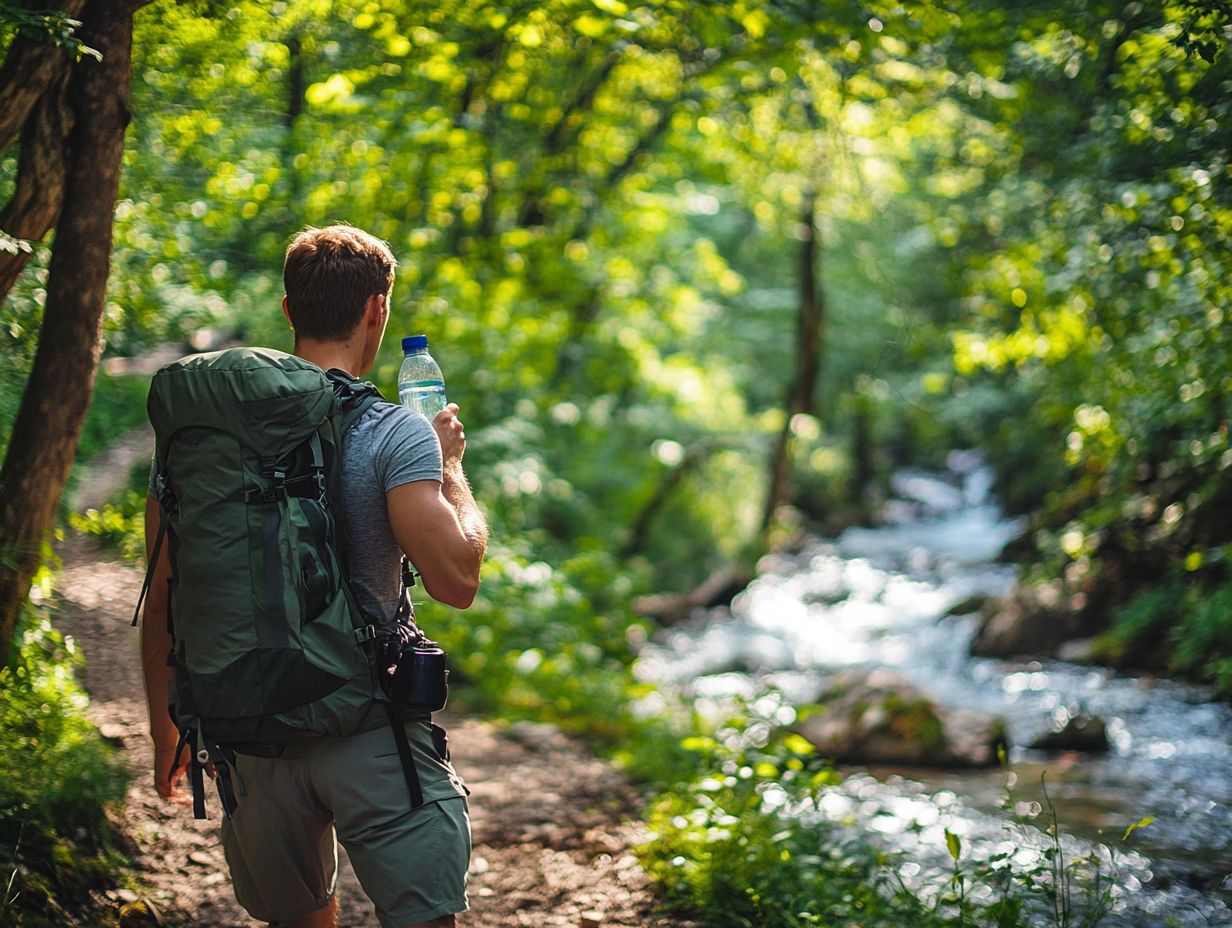
- Adequate hydration is crucial for hiking performance as dehydration can lead to fatigue, dizziness, and other symptoms that can hinder your journey.
- Recognizing the signs of dehydration, such as dry mouth and dark urine, is important for addressing it promptly by drinking water and taking breaks in shaded areas to maintain your fluid intake.
- To stay hydrated while hiking, drink water at regular intervals, bring a reusable water bottle, and consider using special drinks or powders that help replace lost minerals for longer hikes.
The Importance of Hydration During Hiking
Hydration is essential for every hiker, but it takes on even greater significance for senior hikers and older adults. With a diminished sense of thirst and unique hydration needs, they must be particularly mindful of their fluid intake.
Proper hydration not only boosts hiking performance but also enhances safety during outdoor adventures. It significantly lowers the risk of severe dehydration and heat exhaustion. By staying well-hydrated, older adults can embark on their hikes with confidence and comfort, turning each journey into a more enjoyable and fulfilling experience.
Effects of Dehydration on Hiking Performance
Dehydration can seriously undermine your hiking performance, especially as you age, leading to decreased energy levels, diminished focus, and heightened fatigue.
When you re out there engaging in activities like hiking, it s vital to stay properly hydrated. Even a slight loss of fluids can impact your overall efficiency. This is especially important for senior hikers, as the body may not signal thirst as effectively, raising the risk of dehydration.
Research indicates that just a 2% drop in body weight from fluid loss can result in noticeable declines in endurance and cognitive abilities, making navigation and decision-making on the trail more difficult. Older individuals often face an increased vulnerability to heat-related illnesses, underscoring the importance of maintaining consistent fluid intake while savoring those outdoor adventures.
Signs and Symptoms of Dehydration While Hiking
Recognizing the signs and symptoms of dehydration while hiking is crucial for your safety, particularly if you re among older adults who might not readily notice those early warning signals.
Common indicators to watch for include signs that may reflect a diminished sense of thirst:
- dry mouth
- fatigue
- dizziness
- reduced sense of thirst
These can escalate rapidly into severe dehydration if not addressed in time. By understanding these symptoms, you give yourself the power to take immediate action and implement effective hydration techniques while on the trail, such as drinking regularly and recognizing your drinking habits.
Recognizing and Addressing Dehydration
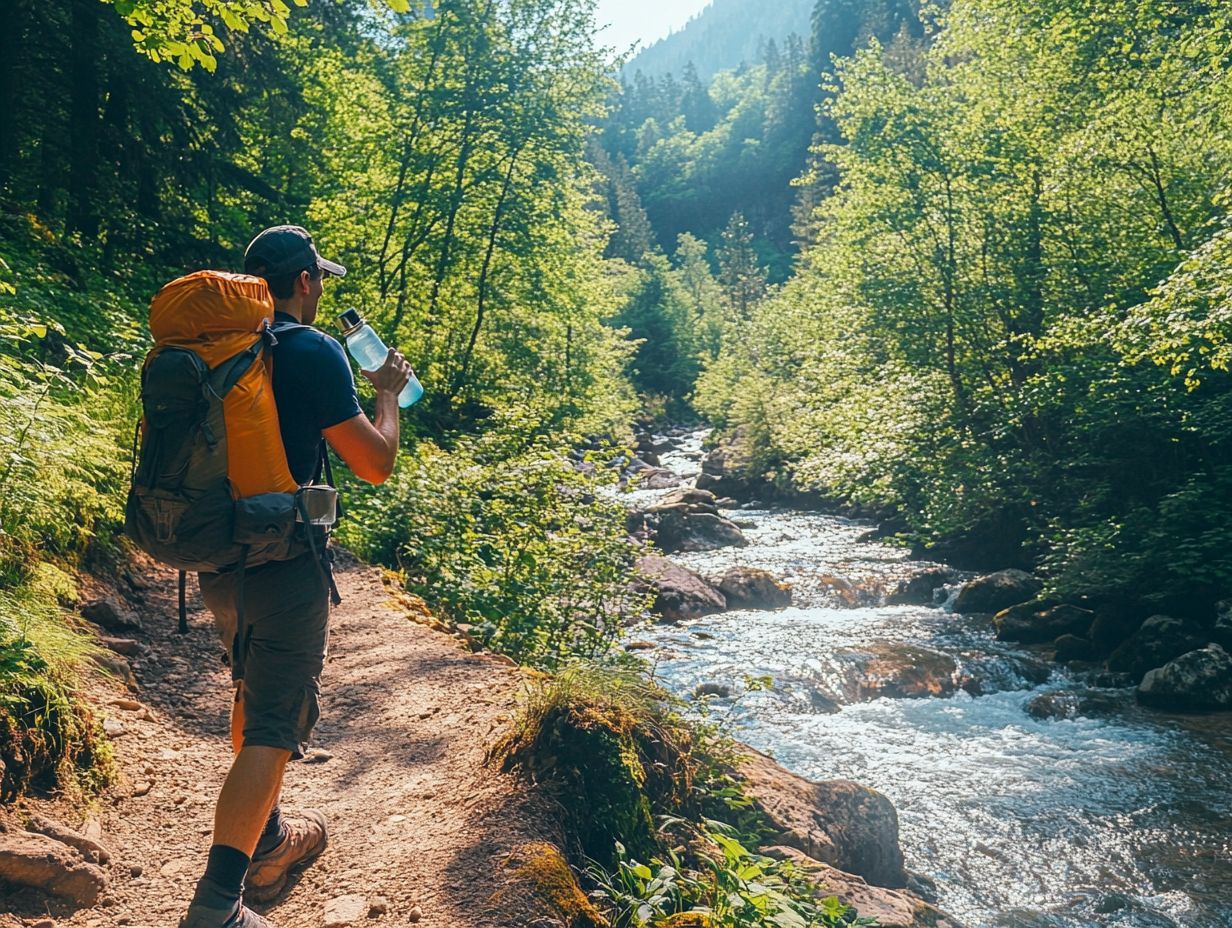
Recognizing and addressing dehydration during a hike means you need to understand your own drinking patterns. Take a proactive approach to fluid intake, especially as you get older, when you may underestimate your hydration needs.
Staying attuned to your body’s signals, like dryness in your mouth or reduced urine output, is crucial for gauging your hydration levels. Ensure you maintain your water level by drinking water regularly instead of waiting until you feel thirsty, as aging can dull that natural cue.
To maintain the best hydration, consider these hydration strategies:
- Carry a reusable water bottle with you.
- Set reminders on your phone to prompt you to drink.
- Incorporate hydration breaks into your physical activities.
If you start feeling weak or dizzy, take immediate action by sipping water gradually or consuming hydrating foods like fruits and vegetables. This way, you ensure that your replenishment is both effective and gentle on your system.
How to Stay Hydrated While Hiking
Staying well-hydrated during your hikes requires a thoughtfully crafted hydration strategy tailored to your unique needs and preferences as an older adult. Discovering local water sources can make your hike more enjoyable and safe! Ensure you carry ample fluids, and consider including hydrating foods like fruits and energy bars in your hiking pack.
By prioritizing effective hydration techniques, you can fully immerse yourself in your outdoor adventures while keeping the specter of dehydration at bay.
Tips for Proper Hydration on the Trail
Proper hydration on the trail requires thoughtfulness and practical tips to elevate your fluid intake and overall hiking experience.
To optimize hydration, aim to sip small amounts of water regularly instead of chugging large quantities all at once. Scheduling hydration breaks every 20 to 30 minutes can work wonders in keeping you on track.
Incorporating electrolyte tablets, which are minerals that help maintain your body’s balance of fluids, into your water can replenish essential minerals lost through sweat. It s also wise to steer clear of alcohol before your hikes, as it can worsen dehydration.
Don t forget about hydrating foods like bananas, which are rich in potassium, and a mix of nuts and dried fruits known as GORP. These treats can further support your hydration levels, fueling your body and enhancing your endurance throughout the journey.
What to Drink While Hiking
Selecting the right beverage while hiking significantly impacts your hydration levels, making it crucial to understand the best options at your disposal.
For senior hikers, water should always take precedence, complemented by fluids that effectively replenish electrolytes lost through sweat, such as sports drinks or electrolyte tablets.
This thoughtful combination will ensure you achieve best hydration and sustain your energy levels throughout your hiking adventure.
Hydration Options and Alternatives
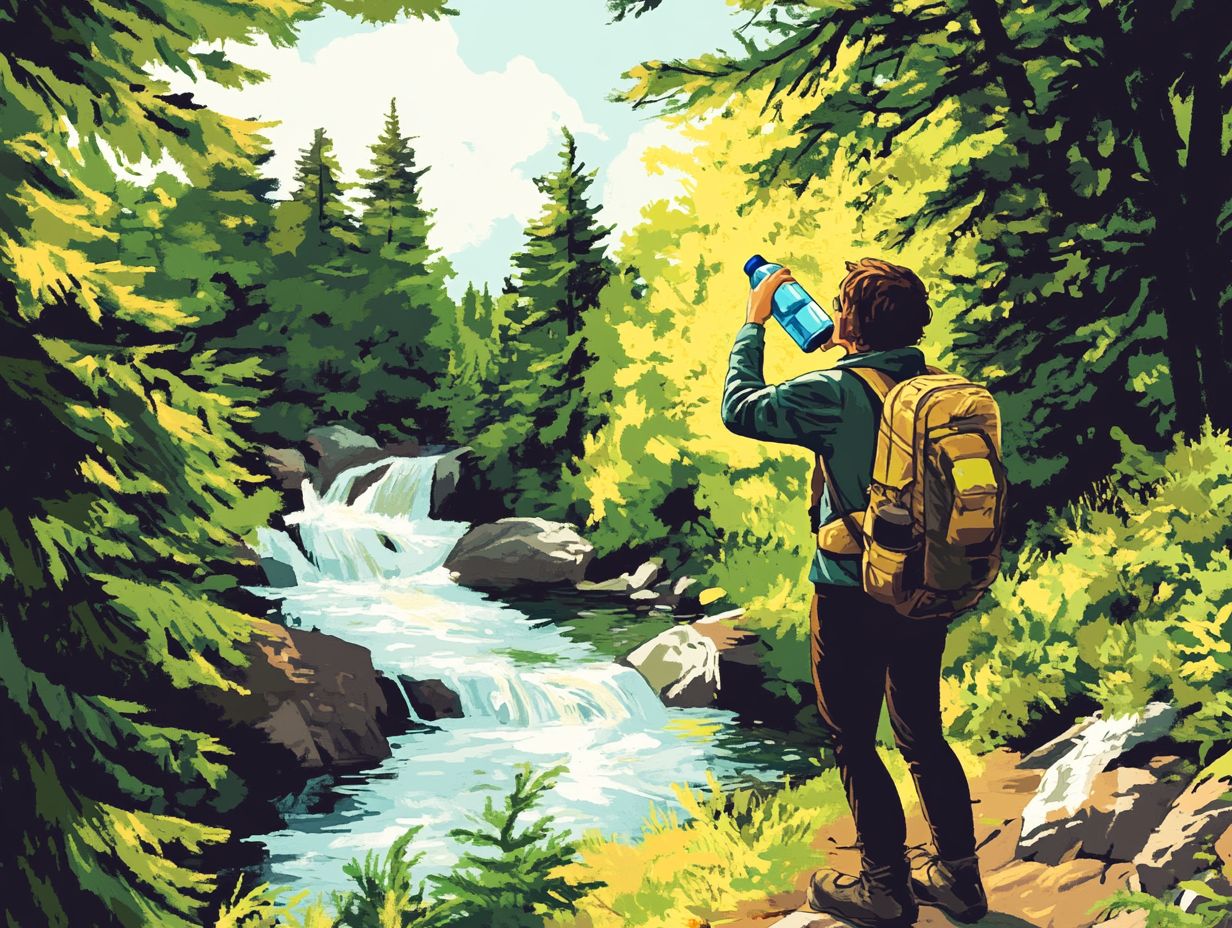
Hydration options for hikers encompass a range of fluids, with water as the essential staple enhanced by choices like sports drinks and natural hydration alternatives.
While plain water is vital for maintaining your basic hydration needs, sports drinks can provide significant advantages during more intense physical exertion, especially for longer hikes. These beverages often include electrolytes, which are instrumental in replenishing the nutrients you lose through sweat, making them particularly effective for endurance activities such as long hikes or trail runs.
Natural hydration sources like coconut water or homemade electrolyte solutions offer a healthier alternative, free from added sugars. Understanding when to select each option is key; for instance, quick sips of water may be adequate for a leisurely stroll, but on those longer, strenuous hikes, opting for a sports drink might be the smart move to sustain your energy levels and avert dehydration.
Stay hydrated and take on new trails with confidence!
Preparing for a Hydrating Hike
Preparing for a hydrating hike requires thoughtful planning to ensure that older adults have an ample supply of food and fluids to meet their hydration needs during the journey. This preparation goes more than just packing enough water; it also involves choosing hydrating snacks such as fruits and energy bars that offer both essential nutrients and hydration.
By implementing effective hydration strategies before stepping onto the trail, senior hikers can prevent dehydration and significantly enhance their overall hiking experience, allowing them to focus on enjoying the journey!
Pre-Hike Hydration Strategies
Implementing pre-hike hydration strategies is essential to ensure the right amount of fluids before embarking on your outdoor adventures.
Proper hydration boosts your endurance and helps prevent cramps and tiredness, especially when facing more challenging trails. To accomplish this, aim to drink water steadily throughout the day leading up to your hike, rather than gulping down large amounts all at once.
Keep an eye out for signs that indicate your hydration needs, such as a dry mouth or dark urine, as these cues can provide valuable insights into your fluid status. Incorporating hydrating foods like juicy fruits and vegetables into your diet can make a significant difference as well.
You may need to adjust your hydration approach based on the duration and intensity of your hike, staying attuned to the need for increased hydration as conditions change.
Frequently Asked Questions
What is the recommended amount of water to drink while hiking?
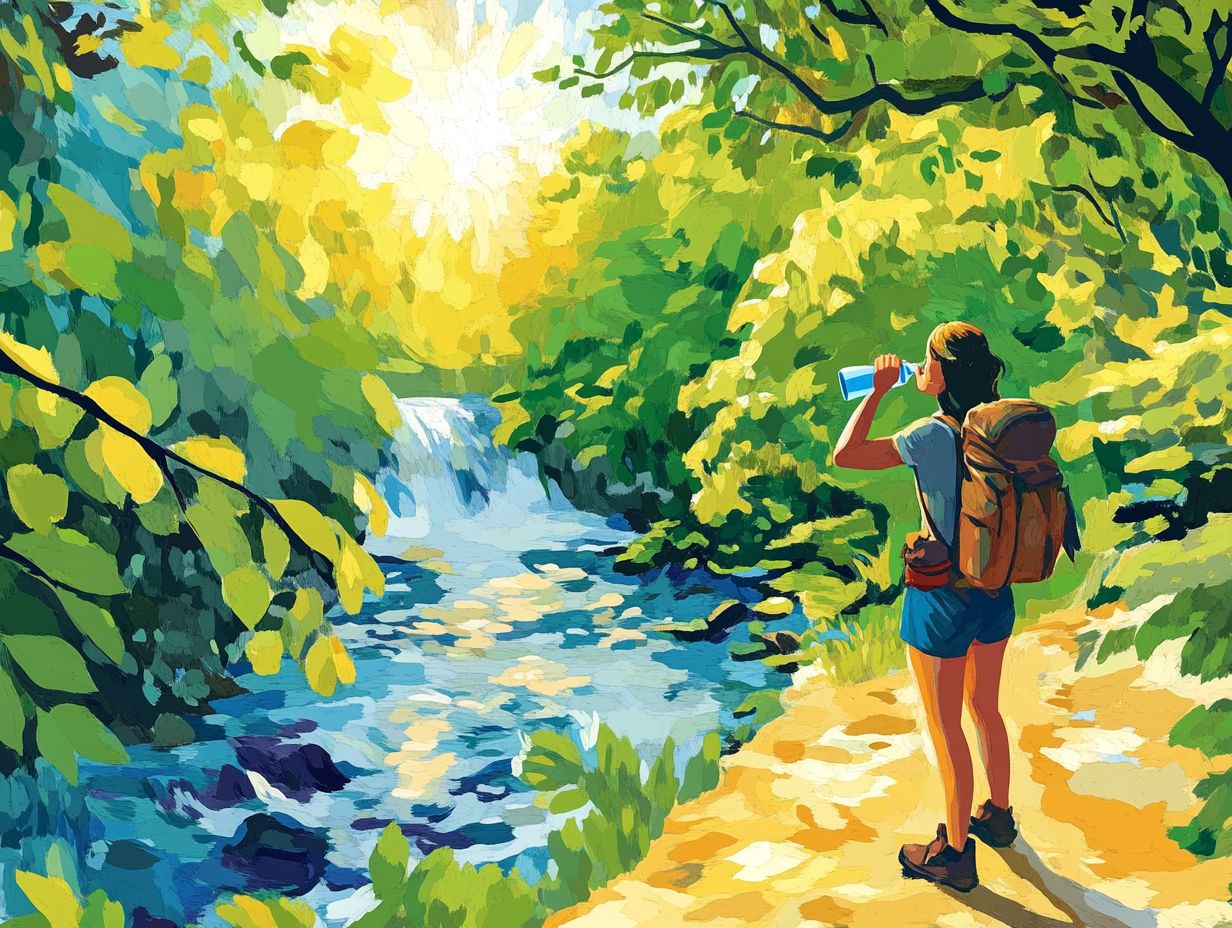
The recommended amount of water to drink while hiking is between 2-4 liters per day, depending on your body weight, distance, weather conditions, and personal experience with hydration.
How often should I stop to drink water while hiking?
It is recommended to stop and drink water at least every 15-20 minutes while hiking. This will help maintain hydration and prevent dehydration.
What are some signs of dehydration while hiking?
Signs of dehydration while hiking include feeling thirsty, dry mouth, dark urine, fatigue, dizziness, and headache. It is important to drink water immediately if you experience any of these symptoms.
Are there any alternatives to water for staying hydrated while hiking?
Yes, there are other options for staying hydrated while hiking, such as electrolyte drinks, coconut water, or sports drinks. These can help replenish electrolytes lost through sweat.
How can I make sure I have enough water for a long hike?
Planning ahead is key! Make sure you bring enough water for your adventure. Calculate how much water you will need based on the length and difficulty of your hike, and make sure to bring extra in case of emergencies.
What are some tips for staying hydrated while hiking in hot weather?
When hiking in hot weather, it is important to drink water before, during, and after your hike. Wearing lightweight and breathable clothing can also help prevent excessive sweating and dehydration. Take breaks in the shade and eat hydrating foods such as fruits and vegetables to help keep you hydrated!
Get ready for your hike and remember: hydration is your best friend out there!

